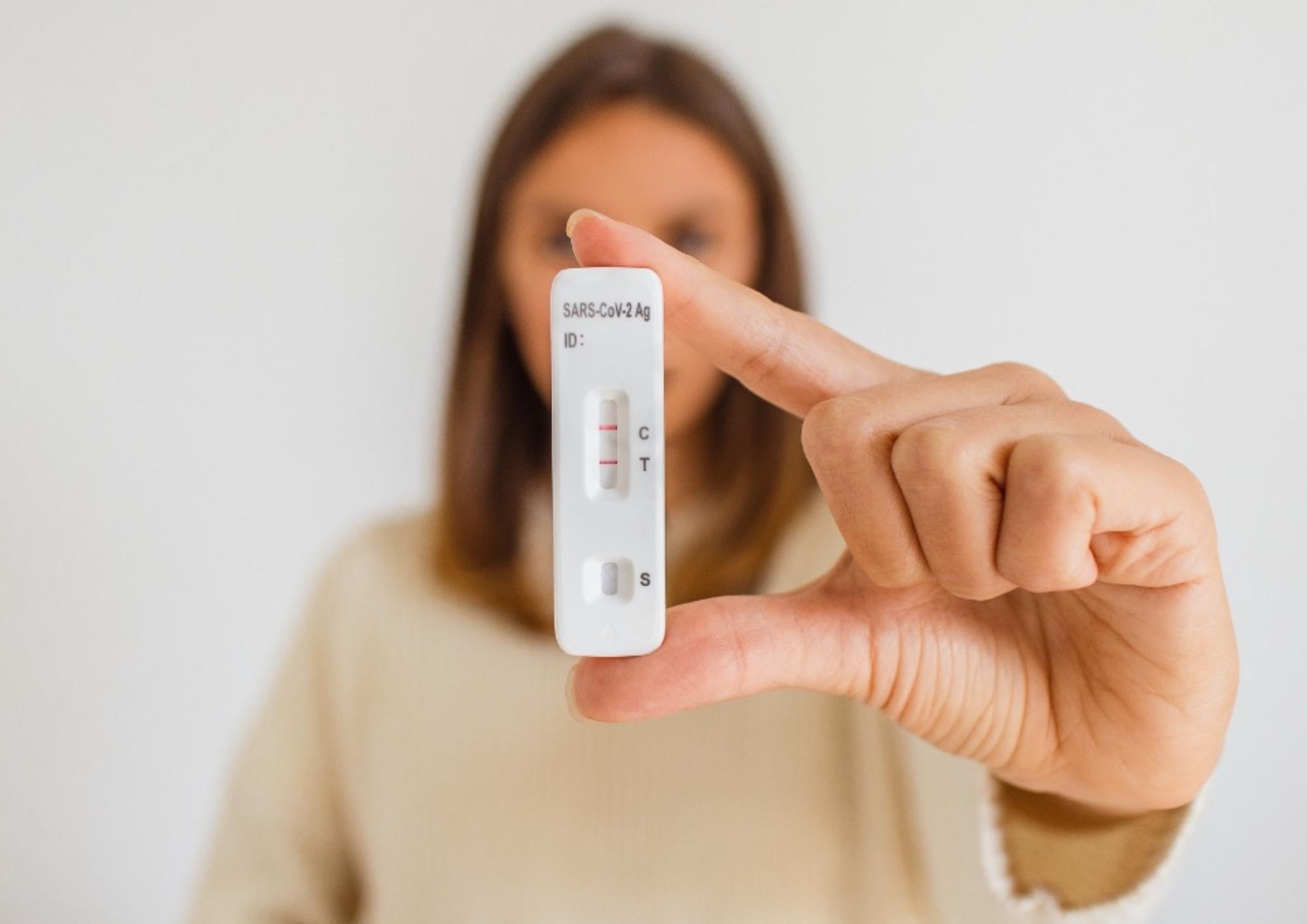If you’ve found yourself sniffling, coughing, and constantly wondering whether you’ve caught the flu or Covid, you’re not alone.

How to Tell the Difference Between Covid and Flu
Every autumn and winter, that same question pops up again and again: how do you know if you have flu or Covid?
The two viruses have become the ultimate guessing game of modern times. Both can knock you flat, both can spread like wildfire, and both can make you retreat to the sofa with your tissues, tea, and daytime TV.
How to tell Covid and Flu Apart?
But the truth is, there are some subtle, and not-so-subtle, differences between the two. And knowing how to tell Covid and flu apart can really help you look after yourself and avoid passing anything unpleasant to others.
Let’s start with the obvious. Both Covid and the flu are respiratory viruses. They spread through droplets when people cough, sneeze, laugh, or even just talk too enthusiastically.
You can catch either by being close to someone who’s infectious, by touching surfaces they’ve recently contaminated, or by simply letting your guard down with handwashing and hygiene.
The symptoms overlap so much that it’s no wonder people struggle to spot the difference between Covid and Flu without a test.
So, what does the very beginning of Covid feel like?
Most people describe it as a creeping kind of unwellness. You might wake up feeling a little off, not dreadful, but definitely not right.
Maybe you’ve lost your sense of smell or taste, or everything tastes a bit metallic.
Maybe you’ve got a light tickle in your throat, some muscle aches, or a strange kind of fatigue that makes it hard to focus.
These early signs of Covid can be incredibly mild or surprisingly sneaky. Covid often builds up over a few days, while flu tends to hit you like a bus almost overnight. If you’ve ever gone from fine to flat in twelve hours, that abrupt crash is the classic arrival of flu.
What Are The New Flu Symptoms This Year?
Now, if you’ve been wondering what are the new flu symptoms this year, the list does seem to shift slightly as different strains circulate.
Traditionally, flu brings on high fever, chills, pounding headache, sore throat, muscle aches, and that bone-deep fatigue that makes even lifting the kettle feel like hard work.
Lately, doctors are also noting more cases where people complain of nausea, a dry cough, or even mild digestive upset.
But flu rarely causes loss of smell or taste, and while you can feel completely exhausted, it usually doesn’t come with lingering breathlessness once the fever breaks.
What Are The Four Main Symptoms of Covid?
While they can vary from person to person and from variant to variant, the classic four are a persistent cough, fever, loss or change in sense of smell or taste, and shortness of breath.
That being said, newer variants have blurred these lines a bit. Many infected people now report sore throats, runny noses, and headaches instead, which sound suspiciously like the common cold.
That’s where it gets tricky. The only sure way to know which virus you’ve got, especially when symptoms overlap, is to test.
But understanding how these illnesses behave can help you make smarter choices about rest, recovery, and when to call in medical advice.
The timing often gives clues, too. Covid has an incubation period of around three to five days, so you might feel fine for a while after exposure before symptoms kick in.
Flu, on the other hand, usually shows up within one to two days of catching it. Once it hits, flu symptoms tend to peak fast and fade within a week for most healthy people. Covid can linger longer, and even mild cases can leave you drained for weeks. If you’re still coughing or short of breath after that first week, or if your fatigue seems out of proportion, you might be dealing with the after-effects of Covid.
How Long Will It Take Me To Recover From Covid?
Now let’s talk about recovery, because that’s where a little know-how makes a big difference.
Whether you’ve got the flu or Covid, rest is a must. This is because your immune system needs energy to fight the virus, and burning the candle at both ends never helps.
Keep hydrated, which means plenty of water, herbal teas, and clear soups. Don’t overdo caffeine or alcohol, both dehydrate and can make you feel worse.
Food-wise, go easy if your appetite has vanished, but try to eat simple, nourishing meals like soups, stews, or porridge to keep your strength up.
One of the most underrated parts of recovery is sleep. It’s tempting to scroll through your phone when you’re stuck in bed, but switching off screens helps your body produce more melatonin, the sleep hormone that supports healing.
Keep your room cool, dark, and well-ventilated. And though you might be tempted to dose up on decongestants and soldier through your day, remember that flu and Covid aren’t like a mild cold. Rest now so you recover faster later.
People often ask when to see a doctor about Covid or when to seek medical advice about the flu. If you’re healthy and your symptoms are manageable, a low-grade fever, mild cough, sore throat, tiredness, then home care is usually enough.
But if your fever stays high for more than three days, you feel breathless, your chest tightens, you can’t keep fluids down, or your recovery doesn’t seem to be progressing after a week, that’s your cue to call your GP or a medical clinic.
Older adults, pregnant women, those with long-term conditions like diabetes or heart disease, and anyone with weakened immunity should always err on the side of caution and get checked sooner rather than later.
Something else that’s worth remembering is the emotional side of being unwell.
Both flu and Covid can knock confidence as much as they knock energy levels.
It’s normal to feel anxious about spreading the virus to family or colleagues, or to worry about how long you’ll be off work.
If you test positive for Covid, stay home until you feel well enough and at least five days have passed since your symptoms began.
If it’s flu, you’re generally contagious for a similar window, often from the day before symptoms appear to around five to seven days after.
Handwashing, using tissues, airing out rooms, and resisting the temptation to share mugs or utensils can make a real difference in stopping the spread.
Over the past few years, many people have noticed that Covid symptoms have evolved.
Early on, it was mostly about fever, cough, and fatigue. Now, what does the very beginning of Covid feel like? Increasingly, people describe a sore throat as the first sign, often followed by congestion and sneezing. Some even mistake it for hay fever!
That’s why the question of how do you know if you have flu or Covid keeps resurfacing, the goal posts just keep moving. Flu hasn’t changed much, but Covid has learned to disguise itself better.
The best defence against both remains prevention.
Annual flu jabs still make a world of difference, especially if you’re in a higher-risk group.
Covid boosters, meanwhile, continue to protect against severe illness and hospitalisation.
Vaccination doesn’t guarantee immunity, but it gives your body a serious head start.
Pair that with decent hand hygiene, staying home when sick, and covering coughs and sneezes, and you’re doing your bit to keep your community healthier.
If you do end up catching something despite your best efforts, try to embrace the downtime rather than fight it.
There’s something oddly comforting about retreating under a blanket with a good book or favourite film when you’re unwell.
Let your body rest, keep hydrated, and don’t panic if you don’t bounce back straightaway.
Recovery isn’t a race, and everyone’s timeline looks a little different. Some people feel fine after three days; others need two weeks before their energy returns.
Do I Have Flu or Covid?
At Pall Mall, we see countless patients each season asking the same thing: do I have flu or Covid? Often, the diagnosis turns out to be neither, just a common cold or another seasonal virus.
But when you’re the one feeling rough, labels matter less than taking care of yourself properly. Your body is your best guide. If something feels off beyond a typical seasonal bug, it’s worth getting checked. Quick access to tests, consultations, and tailored advice means peace of mind and faster recovery.
So, next time you find yourself waking up with that scratchy throat and foggy head, pause before jumping to conclusions.
Ask yourself how suddenly it came on, what your body is telling you, and whether you’ve had recent close contact with someone unwell.
Keep the essentials in mind: flu usually strikes fast and fierce, while Covid creeps in, changes pace, and may linger longer.
If you're ever unsure, reach out to your medical provider for guidance. Health isn’t something to gamble on, even if it’s just a matter of a few sniffles, it’s worth listening when your body taps you on the shoulder.
We’re living in an age where viruses evolve, knowledge shifts, and everyone’s become a mini-detective in their own health story.
But the fundamentals haven’t changed: rest when you’re tired, drink fluids, eat well, and seek medical help if your instincts tell you to.
Whether it’s flu, Covid, or just the season’s latest sniffly visitor, kindness to your body is the first step toward feeling human again. And that, truly, is the smartest remedy of all.
Always here to help, whenever you need us
Our expert team are always here to help, advise and arrange appointments with our specialist consultants.












